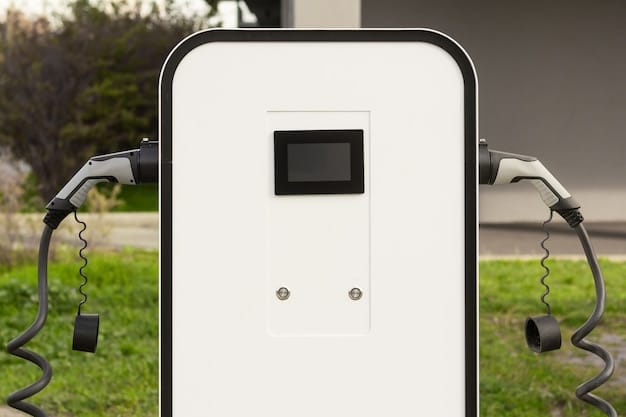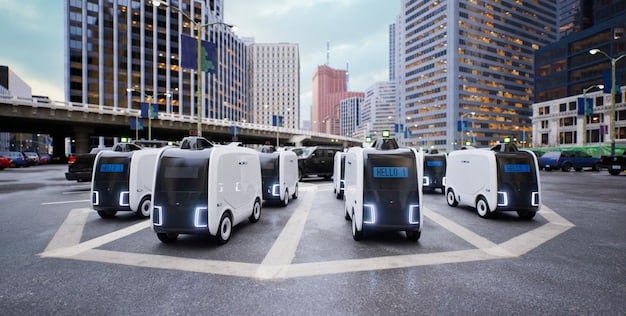Transportation Tech Startups: Disrupting US Industry with Innovation

Transportation technology startups in the US are revolutionizing the industry by developing innovative solutions such as electric vehicles, autonomous driving systems, smart logistics, and sustainable transportation options to address modern challenges.
The landscape of transportation is undergoing a massive transformation, fueled by innovative tech startups eager to disrupt traditional models. In the US, these transportation technology startups: disrupting the industry with innovative solutions in the US are at the forefront, developing cutting-edge technologies that promise to reshape how we move people and goods.
The Rise of Transportation Technology Startups in the US
The United States has emerged as a hotbed for transportation technology startups: disrupting the industry with innovative solutions in the US, attracting significant investment and talent. These startups are challenging established players by offering new approaches to old problems, leveraging advancements in artificial intelligence, data analytics, and electrification.
From ride-sharing and micro-mobility to logistics and autonomous vehicles, these companies are not only creating new business models but also driving sustainability and efficiency within the transportation sector.
Key Factors Driving Growth
- Government Support: Policies and incentives promoting innovation and sustainability.
- Venture Capital: Substantial investment in early-stage companies.
- Technological Advancements: Breakthroughs in AI, battery technology, and connectivity.
Areas of Innovation
- Electric Vehicles (EVs): Startups focused on EV development, charging infrastructure, and battery technology.
- Autonomous Vehicles (AVs): Companies developing self-driving technology for various applications.
- Smart Logistics: Solutions optimizing supply chain management and delivery services.

The transportation technology sector in the US is experiencing unprecedented growth, driven by a combination of technological advancements, favorable government policies, and increasing consumer demand for sustainable and efficient transportation options. This dynamic environment has created fertile ground for startups to emerge and disrupt traditional transportation models, leading to a wave of innovation across various sub-sectors.
Electric Vehicle (EV) Startups: Driving Sustainability
Electric vehicles are becoming increasingly mainstream, and US startups are playing a crucial role in accelerating this shift. These companies are not just manufacturing EVs but also developing innovative battery technologies and charging solutions to address range anxiety and improve the overall EV experience.
Companies like Rivian and Lucid Motors are challenging established automakers with their advanced EVs, while others are focusing on niche markets like electric motorcycles and scooters. The growing availability of charging infrastructure and government incentives are further fueling the adoption of EVs in the US.
Notable EV Startups
- Rivian: Known for its electric pickup trucks and SUVs designed for adventure.
- Lucid Motors: Focused on luxury EVs with long range and high performance.
- Proterra: Specializing in electric buses for public transportation.
Advances in Battery Technology
Battery technology is a critical component of EVs, and startups are working on improving energy density, charging speed, and battery life. Innovations in solid-state batteries and alternative materials are paving the way for more efficient and sustainable EVs.
Significant funding is being directed towards startups that are developing next-generation battery technology, promising longer ranges, faster charging times, and enhanced safety. These advancements are essential for making EVs a viable option for a broader range of consumers and applications.

Autonomous Vehicle (AV) Startups: The Future of Mobility
Autonomous vehicles represent a paradigm shift in transportation, promising to improve safety, reduce congestion, and increase accessibility. US startups are at the forefront of this revolution, developing self-driving technology for cars, trucks, and even drones.
Companies like Waymo (though not technically a startup anymore, it originated from Google’s self-driving car project) and Cruise are leading the way in developing fully autonomous vehicles, while others are focusing on advanced driver-assistance systems (ADAS) that enhance safety and convenience. The regulatory landscape and public acceptance remain key challenges for the widespread adoption of AVs.
Leading AV Companies
- Waymo: Developing fully autonomous driving technology for ride-hailing and delivery services.
- Cruise: Focused on deploying autonomous vehicles in urban environments.
- Nuro: Specializing in autonomous delivery vehicles for local commerce.
Challenges and Opportunities
Developing autonomous driving technology is a complex and challenging undertaking, requiring vast amounts of data, sophisticated algorithms, and rigorous testing. However, the potential benefits are enormous, including reduced accidents, improved fuel efficiency, and increased mobility for the elderly and disabled.
Startups are working to overcome these challenges through innovative approaches to sensor technology, AI algorithms, and simulation environments. Collaborations with established automakers and technology companies are also playing a crucial role in accelerating the development and deployment of AVs.
Smart Logistics Startups: Optimizing Supply Chains
Efficient logistics are essential for a thriving economy, and startups are leveraging technology to optimize supply chain management and delivery services. These companies are using data analytics, machine learning, and automation to streamline operations, reduce costs, and improve customer satisfaction.
From warehouse automation to route optimization, smart logistics startups are transforming the way goods are transported and delivered. The rise of e-commerce has further fueled the demand for innovative logistics solutions, creating opportunities for startups to disrupt traditional players and offer more efficient and sustainable services.
Key Areas of Focus
- Warehouse Automation: Using robotics and AI to improve efficiency in warehouses.
- Route Optimization: Developing algorithms to find the most efficient delivery routes.
- Real-Time Tracking: Providing customers with up-to-date information on shipment status.
Smart logistics startups are revolutionizing the supply chain industry, offering innovative solutions that enhance efficiency, reduce costs, and improve overall performance. By leveraging advanced technologies such as artificial intelligence (AI), machine learning (ML), and the Internet of Things (IoT), these startups are enabling businesses to optimize their logistics operations and gain a competitive edge in today’s rapidly evolving market.
Micro-mobility Startups: Revolutionizing Urban Transportation
Micro-mobility solutions, such as electric scooters and bikes, are transforming urban transportation by providing affordable, convenient, and sustainable alternatives to cars. Startups are leading the charge in this space, offering innovative hardware, software, and business models that cater to the unique needs of urban commuters.
Companies like Bird and Lime have popularized electric scooter sharing, while others are focusing on electric bike rentals and subscription services. The integration of micro-mobility with public transportation is creating a more seamless and sustainable urban mobility ecosystem.
Popular Micro-mobility Options
- Electric Scooters: Shared scooters for short-distance trips.
- Electric Bikes: Rental and subscription services for longer commutes.
- Dockless Bike Sharing: Convenient and flexible bike rental options.
Micro-mobility startups are reshaping urban transportation by providing convenient, affordable, and eco-friendly alternatives to traditional modes of transport. By offering electric scooters, bikes, and other small vehicles for short-distance travel, these startups are addressing the growing demand for sustainable and efficient urban mobility solutions.
Challenges and Opportunities for Transportation Technology Startups
While the transportation technology sector presents immense opportunities, startups also face significant challenges, including regulatory hurdles, competition from established players, and the need for substantial capital investment. Overcoming these challenges requires a strategic approach, strong leadership, and a commitment to innovation.
The United States is experiencing a surge in transportation technology startups, and this transformation presents both challenges and opportunities for these emerging companies as they strive to innovate and disrupt the transportation industry. They must navigate complex regulatory landscapes and adapt to quickly changing customer expectations.
Regulatory Landscape
Navigating the complex regulatory landscape is a major challenge for transportation technology startups. Regulations governing autonomous vehicles, electric scooters, and other new modes of transportation vary significantly from state to state and even city to city. Startups must invest significant time and resources in understanding and complying with these regulations, which can be a barrier to entry for smaller companies.
Transportation technology startups must also be prepared to adapt to evolving regulations as governments and regulatory agencies gain a better understanding of the impact of these new technologies. This may require startups to modify their business models or even suspend operations in certain markets until regulatory issues are resolved.
Competition and Consolidation
The transportation technology sector is becoming increasingly competitive, with both established players and well-funded startups vying for market share. This competitive environment can make it difficult for startups to attract customers, raise capital, and achieve profitability. As the industry matures, there is likely to be further consolidation, with larger companies acquiring smaller startups to gain access to new technologies and markets.
Conclusion
Emerging transportation technology startups are reshaping urban mobility through innovative solutions like electric vehicle infrastructure, autonomous vehicles (AV), micro mobility options, and smart logistics while revolutionizing sectors and the ways people and goods are moved across regions.
| Key Point | Brief Description |
|---|---|
| 💡 Electric Vehicles | Startups innovate in battery tech, charging, and new EV models. |
| 🤖 Autonomous Vehicles | AV startups focus on self-driving tech for cars, trucks, and drones. |
| 🚚 Smart Logistics | Startups optimize supply chains with AI, automation, and data analytics. |
| 🛴 Micro-mobility | Electric scooters and bikes provide affordable, sustainable urban transport. |
FAQ
▼
These are companies that develop innovative solutions for enhancing transportation using technologies such as electric vehicles, autonomous systems, and smart logistics.
▼
They challenge traditional models, drive sustainability, and offer efficient transport options, vital for modernizing urban and rural mobility across the United States.
▼
They often encounter hurdles like complex regulations, intense competition, and the necessity for significant capital investments to scale their technologies.
▼
By introducing micro-mobility solutions and optimizing logistics, they help reduce congestion, lower emissions, and improve access to transportation in cities.
▼
Government policies such as incentives for EVs, and support for innovation, encourage these startups and promote the development of sustainable transport solutions.
Conclusion
In conclusion, transportation technology startups in the US are at the forefront of revolutionizing how we move, offering innovative solutions that promise a more efficient, sustainable, and accessible future for all. As these companies continue to grow and evolve, they will play a crucial role in shaping the transportation landscape for decades to come.





